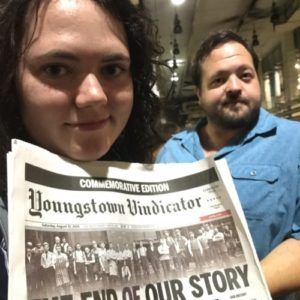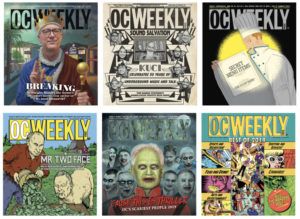They’re Dropping Like Flies
Skip to commentsThe 121-year old Dayton Daily News and two other Ohio newspapers will shrink to three days a week from daily publication to appease regulators who on Monday approved a $3.1 billion acquisition of Cox TV stations and newspapers by private equity firm Apollo Global Management.
The other two papers facing the cuts in print frequency are the Journal-News in Hamilton, Ohio, and the Springfield News-Sun in Springfield, Ohio.
Dayton Daily News editor Jim Bebbington confirmed the news, which is just the latest jolt to newspaper markets as hedge funds and private equity firms buy up the battered newspapers nationally.
That was last week.
This week the New York Post’s headline is “Tribune Publishing is heading for Doomsday in mid-2020″.
Armageddon for Tribune Publishing appears to be mid-2020.
Alden Global Capital, the hedge fund headed by Heath Freeman that’s been dubbed a “strip miner” of newspapers, has a standstill agreement until June 30, 2020, that blocks it from increasing its 32 percent stake in Tribune, Media Ink has learned.
June 30, 2020, is also the expiration date of a separate standstill clause governing the shares controlled by the second-largest Tribune shareholder: Dr. Patrick Soon-Shiong, who owns a stake of more than 24 percent.
That means the LA-based health care billionaire is free to sell — and Alden is free to buy — Tribune stock starting on July 1, 2020.
Relating to the Mike Reed/NPR item posted below this one, Poynter reports
Mike Reed found himself in Nashville addressing the staff of The Tennessean
Question. “What worries you most?”
Reed: “A recession next year. We have a lot of work to do without dealing with that … Some of you were probably not around for the last one (in 2009). It was just awful.”On the expense side, Reed said that he expects big savings from consolidating printing, circulation and other business functions, particularly in states like Florida or Michigan, where both companies have a number of papers.
Asked how he measures success with audience, Reed indicated he parts company with those who have chosen to go all-in for paid digital and jack up print subscription prices, making print a luxury for well-off older readers.
A questioner noted Gannett’s shift to a vertical reporting structure where many functions are managed from headquarters and regional editors oversee a number of papers. Will that be extended to the GateHouse papers
Yes, Reed said. “We’ve gone so far down the road, it is probably not reversible.
Columbia Journalism Review carries reporter ‘s “When My Newspaper Died.”
WHEN THE VINDICATOR DIED, I knew it meant I’d have to leave my hometown. Again.
The shuttering of Youngstown, Ohio’s daily newspaper in the summer of 2019 meant my days of being a newspaperman in my own city were over. I’d already left Youngstown and returned twice. This time it would likely be permanent, because it had to be; there was no reason left to stay. My family was gone and my career options limited. It was time to go…
In an alternative world…
After nearly a quarter-century reporting on felonious mayors, scandal-plagued DAs, pedophile priests, neo-Nazis and corrupt business owners, the OC Weekly‘s future is unclear.
In a Wednesday afternoon tweet, the alt weekly announced it was shutting down: “Today, the day before Thanksgiving, our owner Duncan McIntosh Company has decided to shut us down. For the last quarter century, we’ve tried to bring good stories to Orange County. It’s been fun, but now we’re done.”
But Duncan McIntosh, the president and publisher of his eponymous company, which mainly puts out boating magazines, tells LAist/KPCC he’s in talks to sell the OC Weekly “to a local businessman.”
An alternative business model for alternative papers?
The Chicago Reader, like many alt-weeklies, has had a tough past few years. Founded in 1971 during a boom time for alternative media, it’s been owned since 2012 by the Chicago Sun-Times — which also experienced its own Michael Ferro wrath, like the Chicago Tribune and Tribune Publishing — and tossed around with leadership changes until it was sold to a private investment group that seemed to have more civic than profit-driven intentions…
Now the Chicago Reader is hitching onto the train of news outlets pivoting to nonprofit life, under the umbrella of the newly-founded Reader Institute for Community Journalism, set to launch in early 2020. This follows a similar pathway of the nonprofit Lenfest Institute owning the for-profit Philadelphia Inquirer. The Reader will pursue nonprofit status…







Comments
Comments are closed.